Title’s Future Won’t Wait—Are You Ready?

If there’s one thing Mies von Seebach wants title professionals to understand, it’s this: The industry’s competitive landscape is changing—fast. Companies that adapt will thrive. Those that don’t will be left behind.
As an Area Manager for Stewart’s Agency Services, overseeing independent agency partnerships in Alaska, Idaho, Oregon, Montana, and Washington, Mies has a unique vantage point. He spends his days visiting title agencies, seeing firsthand where businesses excel, where they struggle, and what’s holding them back. From outdated processes to resistance to technology, he believes title is at a turning point. The question is whether the industry will embrace change—or wait until it’s forced upon them.
The Industry’s Biggest Blind Spot: Resistance to Change
In general, the title industry plays defense. In many ways, that’s fundamentally what the industry is about. A strong defense is the best offense when it comes to protecting consumers and ensuring the sanctity of the transaction. But when it comes to ensuring the viability of a title company’s future, it requires a different mentality.
“Innovation has always been invited to the party,” Mies says. “But only a relative few actually want to dance with it. It’s usually only when the music stops that most scramble to find a date.”
One of Mies’ first experiences with this was Remote Online Notarization (RON).
“My first week with Stewart in 2018, I attended a webinar about RON,” he explains. “I thought to myself, ‘This is great! Who wouldn’t want this?’ Yet adoption was virtually nonexistent.”
To be fair, Mies acknowledges that the industry faced significant barriers to scaling RON—and still does. But title companies weren’t exactly tripping over themselves to overcome those barriers and take advantage of what he saw as obvious benefits.
Then COVID happened. And suddenly, RON made sense.
“That experience taught me a valuable lesson about how change occurs in this industry,” he says.
What Needs to Change—Right Now
Ask Mies what he’d fix first, and his answer is simple: Title companies need to stop treating innovation as optional.
It’s not about chasing the latest trends—it’s about understanding and leveraging tools to solve real problems. Fraud is rising, regulatory scrutiny is increasing, and customer expectations are more demanding than ever. Yet, processes remain painfully manual, job roles loosely defined, and frustration and anxiety are common themes in most title companies.
“These inefficiencies aren’t just frustrating—they’re dangerous to your business on multiple levels,” Mies says. “This is often why good team members leave, why customers choose a different title company, and why fraudsters see a title company as an easy target.”
Innovation looks different for every title company. For some, it’s implementing a standardized process instead of leaving operations up to individual team members. For others, it’s leveraging AI to search underwriting guidelines and bulletins more efficiently. But deciding to look at your business differently - that is how title companies can start to innovate.
“Title insurance is what we do—it’s the product of the business,” Mies says. “But it’s not the only business you’re in. The title companies that understand the bigger picture and innovate accordingly are the ones that will continue to win. You have to actively be seeking for meaningful ways to differentiate the business to both your team and your customers.”
The Next Five Years: The Consolidation Wave Is Here
While AI dominates the headlines, the real shift happening in title is consolidation. Large, well-resourced, traditionally non-title entities see opportunity in the industry and are making heavy investments to enter or expand within it. Often involved in other areas of real estate, these companies are vertically integrating title into their operations—setting themselves up as formidable competitors to the traditional, standalone title and escrow company.
“These aren’t necessarily new trends,” Mies says. “But in an uncertain market, companies like these can afford to be aggressive while others are tightening their belts. So I expect to see an acceleration of that trend in the coming years.”
“Title companies need to be preparing for stronger competitors moving forward.” Mies warns. “Being ‘local’ will always matter in real estate but it isn’t going to be enough on its own to keep market share.”
What’s Coming in 10–20 Years?
Mies envisions a future in title & escrow where technology will facilitate a more human experience, not less of one. Today, the industry spends much of its human capital on the urgent rather than the important. Title professionals are exceptional at solving other people’s problems—often at the expense of solving their own. That’s not sustainable. The only logical solution is to integrate technology to handle the technical issues so that people can focus on the human ones.
But his biggest concern? Title’s failure to tell its own story.
“I don’t think you have to look much further than President Biden’s State of the Union address to gauge how well we’re doing at communicating our value,” Mies says. “We have to recognize that what we’ve done so far to tell our story isn’t getting the job done.”
Title professionals have spent decades defending the status quo. Now, they need to define the future—before someone else does it for them.
Mies is optimistic about where title is headed, but he knows the future is getting less patient.
“You’ve got to learn to fall in love with the process of improving your business,” he says. “Everyone wants to have a great business, but very few are willing to do what it takes to build one. The future isn’t waiting for title companies to catch up. The question is: are you ready for it?”
The Growth & Scale Report is published by CloseSimple, and explores strategies for growth and tools for scaling your title or escrow company. The report emphasizes the art of balancing growth and scale, with a focus on personal and organizational success stories. It aims to share insights from industry leaders who have navigated these challenges, providing a platform for broader conversations in the business landscape.
bogid - 27787114388
Related posts
.png?length=350&name=Don%20Kennedy%20~%20CloseSimple%20Growth%20and%20Scale%20Report%20Fall%202024%20(5).png)
Growth & Scale Report
Coffee, Cigars, and a Life Well-Lived in the Title Industry

Growth & Scale Report
Y2K Child: Scott Mrowiec on Change, Communication, and the Future of Title & Escrow

Growth & Scale Report
Chris Sauerzopf Isn’t Waiting for Title to Innovate—He’s Already Building the Future

Growth & Scale Report
Culture First: The Hidden Engine of Growth in the Title Industry